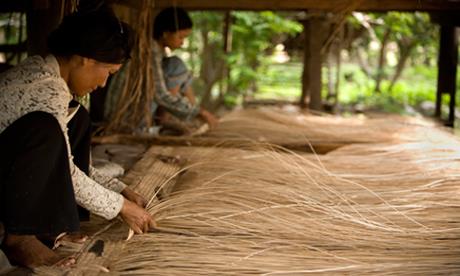Strength in numbers: International Day of Cooperatives
Agricultural cooperatives can be an effective means to empower women in rural areas and help them to overcome the constraints they face, the Food and Agriculture Organization said in a statement released for the 16th International Day of Cooperatives.

© FAO/A.K. Kimoto
2 July 2010, Rome – Education, information, and productive assets are among the resources that cooperatives can provide to women in rural areas, empowering them to become active agents of change, FAO said in a message to mark the 3 July observance of the International Day of Cooperatives.
FAO said cooperatives could provide “a safe environment where women increase their self-confidence, identify their own challenges, make decisions and manage risks.” But the Organization also said more needed to be done to boost the participation of women in agricultural cooperatives, and to document their involvement in such organizations.
The theme for this year’s observance is Cooperative enterprise empowers women. It ties into the 15th year of the Beijing Platform for Action, which sets out an international agenda for women's empowerment. The Platform for Action underwent a major review this year, with a view to overcoming remaining obstacles and new challenges, including those related to the Millennium Development Goals.
As the lead UN agency in the fight against hunger and extreme poverty through agriculture, FAO works with producers’ organizations and cooperatives to support both rural women and men who are small producers in agriculture and who, otherwise, might not gain access to the resources or services they need to improve their livelihoods.
“Cooperatives can provide a wide range of economic and social services to women in rural areas. These include access to input and output markets, as well as financial services such as credit and insurance. By acting collectively within cooperatives, women increase their bargaining power and income while redufcing their transaction costs. In addition, cooperatives play an important role in job creation by directly supporting productive self‐employment and generating additional employment opportunities,” FAO said.
Cooperatives provide over 100 million jobs fworldwide, 20 percent more than multi-national enterprises, according to the International Cooperative Alliance.
In addition to encouraging the formation of women-only cooperatives, FAO encourages women to take leadership roles in “mixed” cooperatives, where the participation of both men and women bring together complementary skills and perspectives that can equally benefit all members.
But women’s active involvement and leadership in agricultural cooperatives continues to be “rather low,” said FAO, although it also said there was a need for more data on the extent of their involvement.
“Beyond the social, political and economic constraints, women often face cultural barriers that restrict their involvement in public meetings or that place their domestic responsibilities before their economic or social involvement in agricultural cooperatives. In some countries, this is due to the basic fact that only owners and tenants of land, most often men, can become members of agricultural cooperatives or that the fee charged for cooperative membership is beyond the means of economically dependent rural women,” the Organization statement said.
FAO called on development programmes and projects to consider earmarking resources and setting quotas specifically geared towards improving women’s skills and participation in producers’ organizations and cooperatives and towards increasing the capacity of cooperatives to address the needs of both men and women.
“The effective participation of women in cooperatives is key for redressing some of the imbalances between women and men in decision-making processes related to agriculture and rural development.”
As it issued the statement, FAO was concluding a study, along with other Rome-based UN agencies and their partners, on the strengthening of rural institutions, with case studies from various countries.
